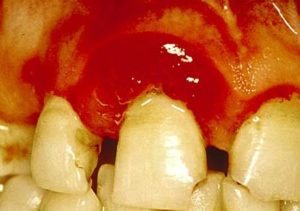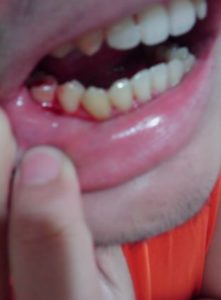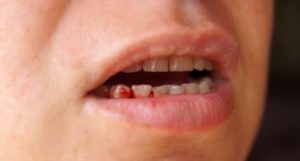Bleeding gums especially when you brush or floss can be bothersome. The bleeding could be a sign of gingivitis or an early stage of periodontal disease including oral cancer. Here is an insight on the causes, the symptoms, treatment and home remedy of how to handle the bleeding.
Bleeding gums symptoms
When you gums start to bleed, that is an early sign that you need to visit you dentist. Understanding the underlying cause of the bleeding is the first step of trying to remedy the situation. Bleeding can be caused by different causes such as brushing with rough bristles, traumas and injury to the gums or due to periodontal disorders.

It is common to experience heavier bleeding on gums due to the high concentration of blood vessels. The concentration also means that the wound appearing on this area will clot and heal faster compared to those appearing in other parts of the body. Depending on the underlying cause of the bleeding, you are most likely to experience the following symptoms:
- Bad or foul mouth odor
- Some will develop painful sore on gums, on the tongue and on inner cheeks
- Painful pimple like lumps on gum
- Severe pain and irritation on gums
- Swelling and inflammation of the gum and mouth lining
- In some case, you may have teeth sensitivity
Bleeding gums causes
Bleeding gums are annoying. They can be very disturbing especially for children. The pain, swelling, and irritation accompanying the bleeding can make it hard for them to talk or eat. When this happens, it is time you seek the help of a dentist. Understanding what could be causing the bleeding will not only help prevent future bleeding but also relieve the symptoms and make your gums and teeth healthy and stronger again.

Here are some possible cause of bleeding gums.
1. Bleeding gums HIV
HIV is the virus that causes AIDS. The virus is passed from person to person through blood- to blood contact and through sex. AIDS will occur when the HIV virus has weakened one’s immune system. Dental problems such as bleeding gums, sore in mouth, lips, and tongue, fungal and yeast infections are the first sign of HIV infection.
You should however not assume you are infected by simple observation of these symptoms. To remove the doubt, you need to be tested for the HHIV virus. This can be done for free in any health care near you.
2. Anemia
Anemia is a condition characterized by lack or deficiency of red blood cells or of hemoglobin in the blood. This causes pallor or weariness. A common form of anemia known as pernicious anemia occurs when your intestines are unable to properly absorb vitamin B12. This is a common cause of week or bleeding gums.
3. STD, Herpes
Oral herpes caused by herpes simplex virus causes sores and blisters to appear on your mouth lining, this will include on your tongue, lips and on the roof of the mouth.
4. Stress
Stress because your body or gums to become inflamed, this makes them more prone to bleeding. Stress also reduces the effectiveness of your immune system making it hard to fight bacteria causing infection. It also makes it hard for blood to clot.
5. Gum cancer, Leukemia
Oral cancer is associated mostly with cigarettes smoking. It is the cancer of the mouth. This type of cancer is noticed as a painless growth on inner cheeks, the gums or at times on the tongue. If oral cancer is the cause of the bleeding, treatment will include surgical resection, radiation therapy and chemotherapy where strong chemical drugs are used to destroy the cancerous growths.
Leukemia, on the other hand, is a malignant progressive disease in which the bone marrow and other blood producing organs produce immature or abnormal leukocytes. This will suppress the production of normal blood cells leading to anemia. Common symptoms will include swollen or enlarged lymph nodes, swollen or bleeding gums, and enlarged liver or spleen.
6. Bleeding gums toothpaste
Oral hygiene is the most recommended way to prevent periodontal problems. The American Dental association recommends brushing your teeth twice in a day with ADA approved fluoride toothpaste. Harsh toothpaste containing more of fluoride concentration might cause damage to your gums leading to bleeding.
7. Tooth decay
Tooth decay or tooth cavity is the other common cause of bleeding gums. This is because the accumulation of plaques become a breeding ground for bacteria causing damage to your gums.
8. Factor V deficiency
Factor V deficiency is a rare bleeding disorder. It is commonly known to cause nosebleed, easy bruising, bleeding under the skin and bleeding gums. This deficiency also causes prolonged bleeding following surgery, trauma or childbirth.
9. Gingivitis
Gingivitis is the inflammation of the gums. It is the initial stage of gum disease and the easiest to treat. Plaque is the direct cause of gingivitis. [Colgate oral care center] gingivitis can be prevented by:
- Proper brushing and flossing of teeth
- Maintaining proper diet
- Avoiding cigarettes
- Upholding regular visits to your dentists.
10. Periodontitis
This is another oral condition that involves the inflammation of tissue around teeth. The condition is often known to cause shrinking of the gum and loosening of the teeth. The condition could also lead to bleeding gums if adequate measures are not taken.
Other cause will include the following:
- Drug and medication causing the bleeding
- Change in flossing routine
- Bleeding disorder
- Hormonal changes caused by stress, pregnancy, and during menstruations cycle
- Gum or tooth infection
- Thrombocytopenia (low platelet count)
- Canker sores
- Smoking or chewing tobacco products
Bleeding gums during pregnancy
Most pregnant women are likely to experience bleeding gums because of the following conditions:

Pregnancy gingivitis
Due to hormonal changes, most mothers-to-be will complain of swollen, red and tender gums. The gums are also likely to bleed when flossed or roughly brushed. Pregnancy gingivitis is thus the inflammation of the gum due to hormonal changes.
Apart from the bleeding, other symptoms will include swelling, redness, pain and difficulty in chewing. Maintaining good oral hygiene can help prevent against pregnancy gingivitis.
Hormonal fluctuations
Apart from when pregnant, hormonal changes could also occur during the menstrual cycle.
Buildup of plaque on teeth
Poor oral hygiene could lead to the accumulation of plaques on teeth, continues accumulation will lead to the formation of tartar which provides a good breeding ground for bacteria. This is what leads to tooth decay and consequently bleeding gums.
Vitamin deficiency C and K
Poor dieting will lead to the deficiency of vital vitamins like vitamin C and vitamins K, without this minerals, your gums are weak and more susceptible to bleeding.
Poor oral hygiene
Poor dental hygiene is the number one cause of most periodontal disease. This includes gingivitis, tooth cavity, and sensitivity. Avoid sugary foods, brush your teeth after meals and schedule regular appointments with your dentist to remedy this.
Bleeding Gums After brushing
Brushing your teeth roughly or with rough bristles or using a harsh toothpaste could all led to bleeding gums especially when pregnant. Instead of a rough toothbrush try a soft one, instead of a harsh toothpaste, try a mild one and gently brush your teeth with a little force to prevent damaging your gums.
Bleeding gums in the morning for no reason causing bad breath
It is common for some patients to complain of bleeding gums in the morning for no particular reason. But could it be true? Can your gums start bleeding for no reason? The bleeding, without doubt, has to be caused by something, some of the common causes f bleedings will include;
Tooth decay also referred to as cavities, this is the decay of the outer surface of the tooth as a result of bacterial action. The main cause of this is the buildup of plaque on teeth and gums. All this will lead to your gums becoming irritated, inflamed and cause them to bleed.
Periodontal disease is the other common cause of the bleeding. This is an advanced gum disease. Severe cases of this diseases will happen when the support structure of your teeth and gums break down from this bacterial infection.
Periodontal diseases and tooth decay are all as a result of poor dental hygiene. This does not only involve cleaning your teeth on a daily basis, but also maintaining a healthy diet, rich in calcium and vitamins to maintain healthy and stronger teeth.
Bleeding gums in child, babies or toddlers while teething
Children are more prone to periodontal diseases. They are also more likely to have tooth decay. Apart from periodontal disease, bleeding gums in children, babies or toddlers while teething could be caused by the following.
- Vitamin deficiencyor poor nutrition is not only a cause for late teething in children but also a possible cause of bleeding gums. If your child is diagnosed with deficiency of vital vitamins and minerals, you can put him on a diet or remedy the deficiency with supplements.
- hash toothpastecan be very reactive especially when teething, when used, you child’s gums could start to bleed
- new toothbrushwith rough bristle could also cause damage the gums of your child causing them to bleed
- Oral or gum diseasessuch as dental cavities or oral cancer could all lead to this kind of bleeding.
Bleeding gums cure, Medicine, treatment
Treatment for bleeding gums will depend on the underlying cause of the bleeding. Removing the bacterial plaque cause gum disease is the best treatment option for the bleeding. This can be done by prescription or over the counter medicine.
You will also need to maintain high levels of dental hygiene to prevent the buildup of plaques that forms tartar which are the breeding grounds for bacteria. Careful choice of both the toothpaste and toothbrush should be observed. Avoid toothbrushes with too rough bristles or too harsh toothpaste that might damage your gums.
To help reverse gingivitis, you need to seek immediate medical attention. This can be very helpful in preventing periodontal disease. Your dentist can perform procedures such as scaling and root planning to slow down the process of gum diseases. Periodontal therapy and dental surgery may be used for server causes of bleeding.
Finally, you will need to maintain a balanced diet to prevent the deficiency of important minerals and vitamins needed for your teeth and gums.
Bleeding Gum Treatment – Video
https://www.youtube.com/watch?v=IEaPw1s907Y
Home remedies for bleeding gums
Bleeding gums, inflammation, irritation and pain in gums can all be managed and controlled at home. If his early signs are not treated o controlled, then your risk them getting worse or developing into advanced and complicated stages of gum diseases.
The best way to handle a bleeding gum is to seek immediate medical attention as soon as possible. Have a dentist look into what could be causing the bleeding to help treat, manage the symptoms and prevent the infection from spreading. Below, we have provided some home remedies to help you handle the bleeding at home.
Regular visit to the dentist
Regular appointments to the dentist are the best way to keep your teeth healthier and stronger. This is because disease and infections can be noticed and treated at early stages before they worsen.
Use soft toothbrush
A toothbrush with soft bristles is the most recommended. Gently brush your teeth to prevent damaging your gums or worsening the bleeding.
Mild toothpaste
Harsh toothpaste has been found to damage your gum thus leading to bleeding. To remedy this, you will need to use a mild toothpaste especially when you have issues with your gums. This should be done especially for children.
Salt water rinse
Saline or salt water rinse is one of the easiest ways to take care of your teeth. Salt contains antibacterial which works well in fighting bacterial infection in the teeth. It also contains anti-inflammatory which works well for swelling.
A salt water rinse is thus good for keeping your mouth fresh even with bleeding gums.
- Add some lukewarm water in a cup
- Into it add a tablespoon of kitchen salt
- Gently stir to mix
- Gargle the resulting mixture for 5 minutes
- Repeat this after every 4 hours.
Maintain a healthy balanced diet
The best way to ensure healthy gums and teeth is by maintaining a healthy balance diet. Increase your intake of fruits and vegetables. Say no to smoking or chewing tobacco, reduce alcohol intake and your gums will be free from gingivitis.
Avoid smoking
As said, smoking or using tobacco products is a common cause of gum or oral disease. Reducing the consumption helps in protecting your teeth.
Drink plenty of water
Drink plenty of water to keep your body hydrated and free from oral disease. Water helps keep your gums ad mouth healthy. It also rinses bacteria from your teeth and helps prevent the buildup of plaque.
Avoid sugary drinks or juice instead drink as much water as you can.
Avoid extremely hot or cold foods and drinks
Too hot food or drink causes scalding, with bleeding gums, you need to avoid them as much as you can.
Avoid stress
High levels of stress affect your oral health in a number of ways. Stress increases the inflammation in the body which makes your gums more likely to bleed. Stress also reduces your immune system functionality making it hard for your body to fight infection or aid in healing.
Honey paste
The anti-bacterial properties of honey make it an essential home remedy for a number of body ailments. Honey also contain vitamins and minerals that provide the important nutrients for maintaining healthy gums.
After rinsing with salt or with a mild toothpaste, you can rub some raw organic honey on your gums twice a day.
Fresh aloe Vera gel
Aloe Vera is the other commonly used remedy for skin and oral disorders. It contains some anti-inflammatory properties that offer relief for swelling, inflammation, itching and burning sensation that accompanies bleeding gums.
Just like honey, massage some squeezed aloe Vera gel on your gums.
Extra virgin oil
You could also try some extra virgin olive oil. It contains oleic acid and flavonoids which are good anti-inflammatory agents. This is the best remedy for inflamed and bleeding gums. Swish the oil around them mouth then spit it. This way, you are able to wash away all the toxins.
Raw vegetables
For a healthy body, you need as many vitamins and minerals as you can get. All this ca be acquired by increasing your intake of raw vegetables.
Swish with baking powder
The other easily available remedy you could use is baking powder. Instead of using your normal toothpaste, switch it with some baking soda instead. You could even start by preparing a paste of baking powder with water.
Citrus fruits
From our discussion, we have seen that vitamin C deficiency could lead to bleeding teeth. Fruits like citrus, oranges, lemons, and vegetables such as broccoli and cabbage can really help remedy this deficiency.
Sources and references.
- Causes of bleeding gums: http://www.colgate.com/en/us/oc/oral-health/conditions/gum-disease/article/5-causes-of-bleeding-gums-you-should-know-0613
- Bleeding gums:https://medlineplus.gov/ency/article/003062.htm
- Causes and symptoms of bleeding gums: http://www.healthline.com/symptom/bleeding-gums
- Basic gums problems: http://www.webmd.com/oral-health/guide/gum-problem-basics-sore-swollen-and-bleeding-gums#1
- Teeth and gums in pregnancy: http://www.webmd.com/oral-health/guide/gum-problem-basics-sore-swollen-and-bleeding-gums#1
- Causes and effects of bleeding gums: http://www.bleedinggums.com/bleeding-gums/causes-and-effects/
